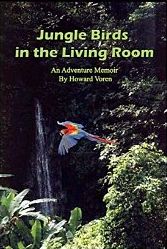Proventricular Dilatation Disease (Macaw Wasting Syndrome)
© Howard Voren. Click here to use this content.Q: We have approximately 100 pairs of birds set up for breeding and have had a closed aviary for six years. About four months ago, we brought a 3-year-old greenwinged macaw to our avian vet because it was very fluffed and had lost a lot of weight. The bird was born and handraised at our aviaries. He suggested that we hospitalize the bird at his clinic so that it could receive proper supportive care until a definitive diagnosis could be made. The bird had a bacterial infection. Two weeks later, after the vet finished the antibiotic therapy, the bird was returned with a clean bill of health. The bird did appear to be completely recovered and, within the following month, regained most of its lost body weight. We never put the bird back with our other birds. We kept him in the den where he could get special attention.
One month later, the bird began passing very large droppings and losing weight. We brought it back to the vet, and he again asked that we hospitalize the bird at his clinic. Two weeks later, after many costly tests, the vet told us that the bird had wasting syndrome. It was explained to us that there is no cure for this disease and that the bird should be “put to sleep” so it will not continue to suffer a slow death from wasting away. Although this is hard to handle, we understand that we must face reality. His second demand is that we immediately stop all sales to prevent transmitting the disease to other aviaries or pet shops. We also accept that this is the ethical and moral thing to do.
We have a major problem with his third demand. He claims that the disease is so contagious that any birds that breathe the same air as the infected bird are suspect, and once the disease is in an aviary, it will move slowly through the entire flock. He believes that we should kill all the rest of the birds in our aviary, clean and disinfect everything and start over. Do you know of any other alternative? How could our baby have gotten this disease in an aviary that has been closed for six years?
A: Unfortunately, there is still much to be learned about wasting syndrome (proventricular dilatation disease [PDD]). Current information seems to lead one to believe that an exposed bird can break down weeks after exposure or can harbor the disease for several years. Consulting with vets who are very knowledgeable on the subject leads me to believe that six years is more than enough time for the disease to have surfaced if it was present. The question as to where your bird picked up this disease if it was not in your aviaries is difficult to answer. You could have carried it on your hands, in your hair or on your clothes when you were near other birds. From the scenario that you have outlined, it seems highly possible to me that your bird may have picked it up in the vet’s clinic while being hospitalized for the bacterial infection. I strongly agree with your vet that you should not sell any of your birds, either babies or breeders. I strongly disagree with the vet that you should kill all of your birds because they might have been exposed to a disease that at this time appears to be airborne. I would wait one full year, and if there are no further breakdowns, forget about it.
If, as you say, the green wing was kept away from your other birds after it came back from its first trip to the vet’s clinic, your other birds may not have been exposed. That’s a lot more than can be said for all of the other birds that were hospitalized in the vet’s clinic at the time your green wing was hospitalized there, waiting for the fateful diagnosis.


